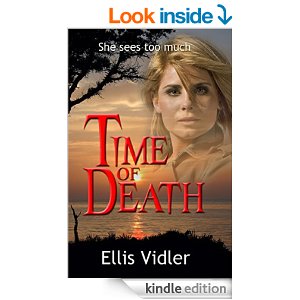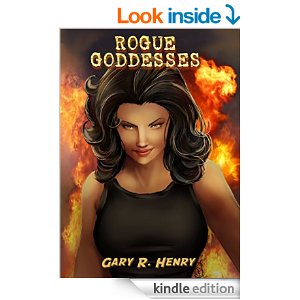Let me begin by saying that writing a novel is a terrific achievement. I know, having written two. My hat is off to anyone who can complete a novel.
That said, here is my honest opinion of Time of Death, a crime thriller with a paranormal edge, by Ellis Vidler.
Characters: The narrative follows artist Alex Jenrette as she tries to stay alive while in the cross hairs of two hit men. Alex is gifted — though she might say “cursed” — with “automatic drawing.” When a spiritual power outside herself wants to communicate about violence or death, Alex’s hands itch and she finds herself sketching victims and crime scenes. Far from finding this ability helpful, the police she brings her sketches to invariably believe Alex must have been a witness, if not a perp.
In protagonist Alex, Ellis has created a fully formed, sympathetic, multi-dimensional heroine. It’s easy to like her since she cares about people and animals, and is willing to put herself in harm’s way when needed to protect those she cares about. Alex is emotionally damaged, however (who isn’t?) by a husband whom she adored, but who died in a motorcycle crash shortly after Alex learned he’d betrayed her with someone close to her.
“Goldy-haired” — as one character describes her — Alex is supported by an excellent cast, including her glamorous folk-singer aunt and fellow-psychic Isobel; handsome leading man and war-veteran Connor Moran, a D.A.; and a full complement of carefully, uniquely crafted heavies.
Ellis hits what I call the “character triangle” like it’s a musical instrument. She brings her characters into full three-dimensional life with physical description, dialogue and action. Though some of her characters have less space in the story than others, every one is fully formed. There are no “extras” or supernumeraries to be found.
Even the used Range Rover Alex buys after her Kia gets totaled, during an attempt on her life, gets a name — Sally Ride, and some descriptive love.
Plot: When shady real estate tycoon Donald Rollins mistakenly assumes Alex may have witnessed his murder of his partner, he calls in two hit men to silence her. Although she doesn’t realize it right away, Alex does know about a piece of evidence that can help establish the victim’s time of death, and nail Rollins — unless his killers get to her first.
Setting: Much of the action takes place on fictional Chicora Island, just off the coast of Charleston, S.C. Though the name is fictional, there are many such actual islands in that locale. The name Chicora, from a Native American tribe that once lived in the area, is also commonly found there.
Ellis does a fair job with the setting, slipping in details here and there, where they’re needed to understand a scene.
Alex stuffed her sketchpad and pastels into a canvas tote and slung it over her shoulder, then started out for the beach. Yesterday’s rain left a veil of mist over the landscape, wreathing it in mystery, and she hoped to capture the atmosphere in her drawings before it burned off.
She hurried. Instead of her usual route along the hard sand by the water, she cut across the road and through the trees toward the sheltered cove where her tree spread its welcoming arms.
There are some nice hints here and there, but I love this part of the country — southern and mid-Atlantic coast — and would’ve liked a little more.
What I thought could’ve been done better: Very little. Time of Death is a professional presentation that hits on all cylinders. My only suggestions are going to be unique to my own personal tastes.
First, as I’ve mentioned, I would’ve liked a little more description of Chicora. From the hints Ellis offers, it sounds like a wonderful, windswept little sandy piece of paradise, facing the great gray Atlantic on one side, and… well, you get the idea. Part of why I read, anyway, is to visit exotic locales like fictional Chicora. That’s not to say there isn’t any description at all. Ellis does what’s needed. But I would’ve like to have experienced the setting in the same three dimensions Ellis bestows on her characters.
Also — just a minor observation — the leading man as war-veteran is awfully common, in my experience. I don’t mind it — I’m retired Navy — but it seems like a shortcut to sympathy, sometimes. Not that it doesn’t work, which is why I guess it still gets used.
The only other thing is Alex’s “psychic artistry.” I liked it, and it’s a different take on psychic crime-solving abilities, but in this particular story, it seemed peripheral. Alex could’ve easily been a non-psychic sketch artist with almost no change to the story. I felt like that interesting character trait didn’t quite carry its weight in the narrative.
Really, the only reason I mention these minor crits is because I’m on record saying there’s always something that could be improved. Ellis earns high marks even in these areas, as you can see in the next section.
What I thought was good: As I’ve mentioned, Time of Death is a polished professional novel. I’ve also already mentioned the wonderful job Ellis does with her characters. The writing itself is tight and verbal, filled with wonderful figures of speech and turns of phrase. Here’s a typical passage showing Alex at work, drawing the scene of Rollins’ murder of his partner — which she doesn’t realize is a murder scene until later.
The bleached skeleton of a tree lay on its side, smooth and ghostly in the fog. Thin light from the morning sun touched the trunk, giving it a shimmering, ethereal glow. She began drawing, selecting pastels without conscious thought. She worked steadily, intent on capturing the scene before her.
When she was satisfied, she replaced the used sheet with a fresh one and shifted so she could see the old pier. The last wisps of mist hung there, creating the image of a translucent walkway floating above the water. The fog hid the broken board— senseless violence. She sketched without thought, her hand moving automatically over the paper. The pier faded from her vision as her fingers flew. A face, swollen and distorted, took shape under the charcoal.
She blinked, startled by what she’d done. Not the mist-shrouded wooden structure, but a dead face. The face that belonged to yesterday’s body, so misshapen she couldn’t tell if she’d ever seen it. Shaken, she ripped the paper off her board and crammed it into her bag. Later she’d examine it, think about what she’d drawn. Now she wanted only to get away.
Ellis doesn’t shy away from violence, and handles it well. Here, punchy and childlike ex-boxer Jelly, Rollins’ bodyguard and driver, tries to save Alex from the two hit men, Hunnicutt and Vargas. He’s blissfully unaware that his boss wants her dead, a sweetly ironic plot development.
Struggling for balance, Alex stumbled toward the side of the road. A hand snaked out and grabbed her. Hunnicutt.
“I ain’t goin’ after you again.” Those pale, flat eyes bored into her.
Locked by the man’s iron grip, Alex turned her head away and watched the two men circle each other, her heart pounding hard enough to shake her.
The knife flashed. Jelly dodged, but the knife sliced through his shirt, nicking his chest. He stepped in close, swinging both fists.
Vargas backed away, slashing at him, but the big man blocked the knife with his jacket, then feinted right while Vargas was off balance.
Jelly landed a solid left, slamming the man’s abdomen, and followed with a hard right to the jaw.
“Unnh.” Vargas grunted as his head snapped back. Holding his hand to his mouth, he turned his head and spat. Jelly charged, and they came together, their momentum carrying them to the ground. They grappled, rolling across the road. Vargas’s blade flashed in the waning light before Jelly knocked the knife from his hand.
A thin red line welled on Jelly’s right arm. Alex gasped, clapped her hand over her mouth to stifle her scream. She couldn’t distract him. The red line widened, ran down his hand. She twisted in Hunnicutt’s grip, kicked at his knee. He jumped back but didn’t let go, twisted her arm till she screamed.
“Do that again, I’ll break it.” The sound of a second car distracted him. A white SUV rumbled across the bridge. Hunnicutt called to Vargas, “Goddammit. Get up. Let’s go.” He tossed Alex toward the car like a sack of trash.
Note the vivid verbs, active voice and varied sentence lengths, all hallmarks of a pro.
Overall: Time of Death is a carefully plotted romantic thriller, filled with a full spectrum of finely crafted characters, from sympathetic to loathsome and every shade in between. Ellis’ tale is fast-paced and action-packed. If its paranormal aspect and setting description aren’t quite as central as I would’ve liked, Time of Death is still an entertaining, suspenseful read from a top-notch professional writer.
Good job, Ellis!
Coming up
Alone by Martha Fawcett
Ascent of Blood by Elizabeth Marx
Super by Princess Jones
The Naked Room by Diana Hockley
And for sexy superheroine paranormal sci fi romantic adventure thrillers, check out my own novel American Goddesses on Amazon or Smashwords, and the newly published sequel Rogue Goddesses ~ thanks for visiting Honest Indie!




Thank you, Gary! Wow. I’m starting my day with a big smile on my face. And you made a good point about a non-psychic artist generating almost the same story. I never realized that. I’ll keep it in mind for the next book. I really appreciate your generous review. Many thanks.
Yet another wonderful review, Mr H. I actually have this one on my kindle and I think I’m now going to be reading it very soon 😀
This sounds brilliant – definitely going on my to read list! I do love the way you put little snippets into your reviews – it gives you a great taste of the writing 🙂